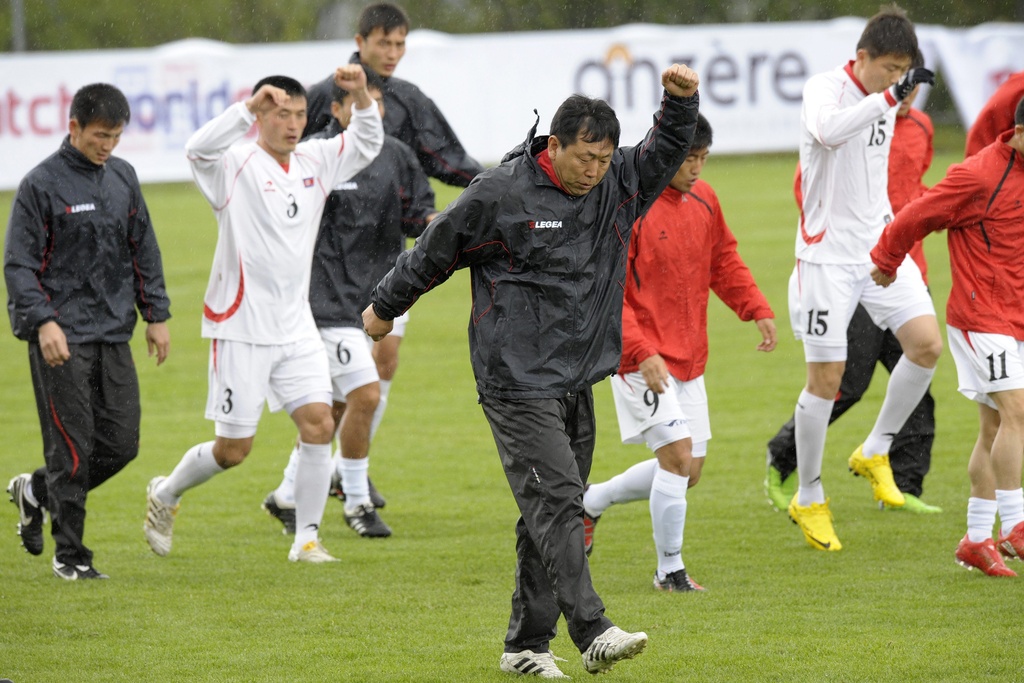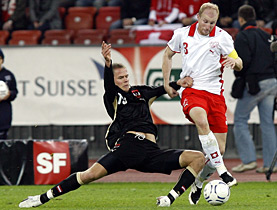Football teams head to Alps before World Cup

Football fans eager to catch a glimpse of their national stars before the World Cup need go no further than the Alps where over half the competing teams are training.
Players from North Korea, Algeria and Ivory Coast have already begun doing shuttle runs and practising penalties on Swiss mountainside pitches and will soon be joined by others from Greece, Japan and Switzerland.
But twice as many teams will be doing their practising in neighbouring Austria.
Five of the nine host cities for the 2010 World Cup in South Africa, which starts on June 11, are above 1,300m, and the final will be held at Johannesburg’s Soccer City Stadium at 1,750m. The Alps are therefore an obvious location to acclimatise and are also within the same time zone.
Canton Valais in southwestern Switzerland, with its secluded mountain resorts, is the preferred destination for several teams.
Swiss national team trainer Ottmar Hitzfeld will be hoping the sunny climes and fresh mountain air will help boost his squad’s chances. They will set down their bags at the five-star Hotel Royal in Crans-Montana from May 25 for a ten-day camp.
Algerian coach Rabah Saadane and his staff have also plumped for the exclusive resort, where they will reportedly use “sophisticated” equipment to analyse players’ performances at altitude.
On the opposite site of the Rhône Valley, the hills and streets of Saas-Fee will be alive with the sound of Japanese from May 26 when the national squad and up to 80 journalists arrive for their two-week camp.
David Graefen, Saas-Fee’s marketing director, said the Japanese had chosen the resort for various reasons.
“It’s at 1,800m, it’s a car-free destination and we’re in mid-season so it’s calm; there are not many tourists about,” he told swissinfo.ch.
Graefen admitted that it had been “quite a struggle” to secure the Japanese, beating off five other Swiss resorts that were in close contention.
The “Elephants” are coming
Elsewhere, the mysterious “Chollimas” from North Korea have been training over the past week at nearby Anzère in preparation for big games against Brazil and Portugal, but there has been no hint of special security during the training sessions, which have been open to the media and public.
Since the beginning of the week the “Elephants” from Ivory Coast have been acclimatising at the Swiss Riviera town of Montreux and will soon be testing the brand new pitch and facilities at Saanenmöser, near Gstaad.
And the Greek team will be hoping to forget national woes when it begins its preparations at Bad Ragaz in eastern Switzerland.
Tough competition
Austria is meanwhile hosting over a dozen teams, including England, who are based in the small ski resort of Irdning.
Like Euro 2008, the contest between the alpine nations, and even between Swiss resorts, to welcome teams has been fierce.
“It’s very intensive competition,” noted Thomas Bieger, a tourism professor at St Gallen University. “Investing in attracting or hosting important people has become a new dimension of their marketing.”
With similar climatic conditions, levels of security and tranquillity, training facilities and the exchange rate appear to be the deciding factors for teams, say specialists.
Véronique Kanel, spokeswoman for Switzerland Tourism, defended Switzerland’s competitive offers and “good” price-quality ratio.
“What counts for the teams is quality,” she said.
But Michel Zen-Ruffinen, former Fifa secretary-general and head of the Matchworld Group, which negotiated the deals between teams and resorts, felt Austria was generally better prepared for welcoming modern-day footballers.
“The teams are more and more demanding,” he told Le Matin Dimanche newspaper.
“Whereas one training pitch used to be enough, now they need two, ideally next to a hotel. These are the kind of conditions you can often find in Austria, but not in Swiss resorts. In Saas Fee we had to invent a pitch.”
The “Weggis effect”
The Swiss tourist industry, which has been hard hit by the economic crisis and the strong Swiss franc versus the euro, is rubbing its hands in expectation.
“It’s positive that we have so many teams training in Switzerland. It’s a fantastic opportunity to show our hospitality and our beautiful country to football fans,” said Kanel.
Graefen said he hoped the arrival of the Japanese squad would “boost business” – 3,500 overnight stays from Japan in 2009 – allowing them to compete with nearby Zermatt.
But he said he was dubious about a possible “Weggis effect”. The small lakeside village near Lucerne was overrun by Brazilian visitors in 2006 when the national team organised a training camp there ahead of the World Cup in Germany. It subsequently doubled the number of visitors from Brazil over two years.
Simon Bradley, swissinfo.ch
Group A: South Africa, Mexico, Uruguay, France
Group B: Argentina, Nigeria, South Korea, Greece
Group C: England, US, Algeria, Slovenia
Group D: Germany, Australia, Serbia, Ghana
Group E: Netherlands, Denmark, Japan, Cameroon
Group F: Italy, Paraguay, New Zealand, Slovakia
Group G: Brazil, North Korea, Ivory Coast , Portugal
Group H: Spain, Switzerland, Honduras, Chile
Switzerland: Crans-Montana, May 25 to June 4.
Algeria: Crans-Montana, May 13-26.
North Korea: Anzère, May 10-23
Ivory Coast: Saanenmöser, May 24-June 9.
Greece: Bad Ragaz, May 21- June 2.
Japan: Saas-Fee, May 26-June 6

In compliance with the JTI standards
More: SWI swissinfo.ch certified by the Journalism Trust Initiative















You can find an overview of ongoing debates with our journalists here . Please join us!
If you want to start a conversation about a topic raised in this article or want to report factual errors, email us at english@swissinfo.ch.